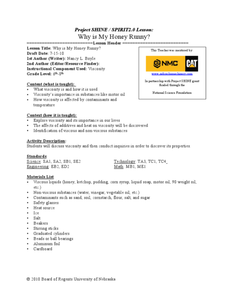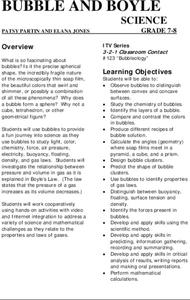Curated OER
Making Soap
Students explore what chemical indicators are and use pH paper to determine if something is alkaline or basic. In this pH lesson students manufacture their own soap.
Curated OER
Making soap you can use
Those textbook experiments are no good. Using this simple method you can make a real bar of soap. It's
Curated OER
Surface Tension (Soap Boat)
Students investigate the affect of soap and water temperature on surface tension.
Curated OER
Bubble and Boyle
Even middle schoolers still enjoy experimenting with bubbles! They execute a series of experiments enabling them to distinguish between convex and concave surfaces, explore the properties of buoyancy, surface tension, and density,...
Curated OER
Playing With Polymers
Students explore the world of polymers. In this chemistry activity, students make polymers and observe their properties. Follow-up questions and extension activities are included.
Curated OER
Why is My Honey Runny?
Students identify the factors that affect viscosity of substances. In this chemistry lesson, students define what viscosity is in their own words. They give real world applications of viscosity.
Curated OER
Water
Students conduct a series of investigations on the unique properties of water. In this general science activity, students explain what causes water's surface tension. They explain the different stages in the water cycle.
Curated OER
States of Matter
Students discuss a given set of questions based on Chemistry and matter and review a glossary of terms. They conduct experiments on each state of matter: "Dry ice and water, Dry ice and soap and Dry ice and Isopropyl Alcohol." and...
Curated OER
Indicator Sponge A Discrepant Event Demonstration
Students explore the use of acid and base pH indicators. The teacher saturates an indicator sponge with congo red solution. Afterwards, the sponge is placed in a blue base solution. Students observe that the blue sponge actually turns...
Curated OER
Activity #14 Floating Bubbles
Students comprehend that Carbon dioxide gas is relatively easy to generate. They comprehend that one way to produce it is with dry ice. Pupils comprehend that carbon dioxide gas can also be produced by combining baking soda with vinegar.
Curated OER
Bubble and Boyle
Middle-schoolers still enjoy playing with bubbles! In this series of eight laboratory activities, science learners explore convex and concave surfaces, angles, gas laws, buoyancy, density and more!
Beyond Benign
Breaking the Tension
The tension builds as learners experiment in your classroom. The 17th installment in a 24-part series has scholars investigate the concept of surface tension. After discovering characteristics of surface tension, they add a compound...
Beyond Benign
In a Lather
Time to come clean! Scholars continue preparing the shampoo they created in the previous two lessons. The purpose of this stage is to calculate the perfect amount of additive to make the shampoo lather.
Cornell University
Nano Interactions
Tiny particles can provide big learning opportunities! Middle school scientists explore the world of nanoparticles through reading, discussion, and experiment. Collaborative groups first apply nanotechnology to determine water...













